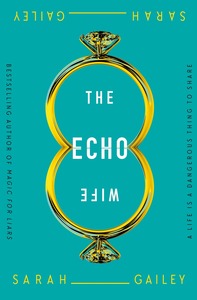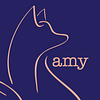You need to sign in or sign up before continuing.
Take a photo of a barcode or cover
Eh. It was not a bad book at all, and it had a good story with thrilling plot points, but it was just rather bland overall. I also didn't really care what happened to the characters, none of them were likable. But if someone asks me what I thought about this book, "eh" is going to be the first sound to come out of my mouth.
good not great!
blake crouch vibes but female centered. love that. A really interesting concept that weaves trauma and science. would recommend !
blake crouch vibes but female centered. love that. A really interesting concept that weaves trauma and science. would recommend !
dark
medium-paced
Plot or Character Driven:
A mix
Strong character development:
Yes
Loveable characters:
Complicated
Diverse cast of characters:
No
Flaws of characters a main focus:
Yes
Graphic: Domestic abuse, Murder
sad
tense
slow-paced
Plot or Character Driven:
A mix
Strong character development:
No
Loveable characters:
No
Diverse cast of characters:
No
Flaws of characters a main focus:
Yes
So, my impression of this book generally is that the narrator - Evelyn - is an insufferable jerk. Through the course of the book, we come to understand why a little better. The author does a very good job of conveying just how insufferable Evelyn is, and it’s understandable that we don’t necessarily have to like Evelyn to understand her or her story.
The writing was good; though, I did have to fight through the first two chapters. The plot moved at a good pace, and the emotional aspects were well explored. That was enough to give the book the stars it has. The rest?
I will sum it up as writing a character that constantly states how much smarter she is than everyone else and who never learns that she is not, despite overwhelming evidence. She ghosts at the thought she has been bested and almost reflects on it, and then does nothing with it. It leaves the reader tired, even if it’s somewhat realistic.
Every time there is a shred of growth in her characterization, we are only offered another example of how awful she is. She is always justified in her mind. Very human, but as a reader it makes it hard to sympathize with her.
To be honest? The clone stuff was nothing really original (except maybe the idea that the husband stole the concept from Evelyn and made a moonshine clone).
The way Evelyn dealt with everything was aggravating. The way Martine handled things wasn’t much better. And what are we to read in to Evelyn’s adapted adoption of her abusive father’s habits in the end? If it’s meant to be a resolution to her trauma, it just honestly isn’t going in the right direction. It makes the ending seem menacing.
How can Evelyn say that things are perfect if Martine’s whole existence is raising a baby by herself without a chance at socialization, employment, or even naps and then spending all of her free time as a research subject?
Why couldn’t Evelyn bring herself to kill Nathan’s clone when she doesn’t see them as people? And how can she continue killing them when she clearly has changed her mind about Martine’s humanity?
My aggravation comes from Evelyn’s constant waffling between how human the clones are. Quit playing in the realm of moral grey area. Either they are people or they are not. In the end, I get the impression that she still sees them as objects.
So, how do her motives make sense outside of a purely selfish outlook?
A better solution, in my opinion, would have been to kill Nathan and Martine’s clones with the “killswitch” and raise the baby. Bury Martine with the others. Then it’s just “Nathan” dying of natural causes. Martine and the baby are already a secret from society. No one would look for them.
But, that would require Evelyn to see her clone as somehow not special. It would require her to take responsibility for a baby. But how is that worse than living a weird shadow life where she sleeps in the same bed as her cloistered clone?
If she believes they are people, she’d give up her research and quit killing them. She’d try to get Martine the help she needs to enter society. But that would hurt Evelyn’s reputation. Selfishness on either side.
The writing was good; though, I did have to fight through the first two chapters. The plot moved at a good pace, and the emotional aspects were well explored. That was enough to give the book the stars it has. The rest?
I will sum it up as writing a character that constantly states how much smarter she is than everyone else and who never learns that she is not, despite overwhelming evidence. She ghosts at the thought she has been bested and almost reflects on it, and then does nothing with it. It leaves the reader tired, even if it’s somewhat realistic.
Every time there is a shred of growth in her characterization, we are only offered another example of how awful she is. She is always justified in her mind. Very human, but as a reader it makes it hard to sympathize with her.
To be honest? The clone stuff was nothing really original (except maybe the idea that the husband stole the concept from Evelyn and made a moonshine clone).
The way Evelyn dealt with everything was aggravating. The way Martine handled things wasn’t much better. And what are we to read in to Evelyn’s adapted adoption of her abusive father’s habits in the end? If it’s meant to be a resolution to her trauma, it just honestly isn’t going in the right direction. It makes the ending seem menacing.
How can Evelyn say that things are perfect if Martine’s whole existence is raising a baby by herself without a chance at socialization, employment, or even naps and then spending all of her free time as a research subject?
Why couldn’t Evelyn bring herself to kill Nathan’s clone when she doesn’t see them as people? And how can she continue killing them when she clearly has changed her mind about Martine’s humanity?
My aggravation comes from Evelyn’s constant waffling between how human the clones are. Quit playing in the realm of moral grey area. Either they are people or they are not. In the end, I get the impression that she still sees them as objects.
So, how do her motives make sense outside of a purely selfish outlook?
A better solution, in my opinion, would have been to kill Nathan and Martine’s clones with the “killswitch” and raise the baby. Bury Martine with the others. Then it’s just “Nathan” dying of natural causes. Martine and the baby are already a secret from society. No one would look for them.
But, that would require Evelyn to see her clone as somehow not special. It would require her to take responsibility for a baby. But how is that worse than living a weird shadow life where she sleeps in the same bed as her cloistered clone?
If she believes they are people, she’d give up her research and quit killing them. She’d try to get Martine the help she needs to enter society. But that would hurt Evelyn’s reputation. Selfishness on either side.
medium-paced
I thought I knew what to expect going into this and I definitely didn't. Loved all the twists, it kept me guessing!
dark
emotional
mysterious
tense
medium-paced
Plot or Character Driven:
Character
Strong character development:
Yes
Diverse cast of characters:
Yes
Flaws of characters a main focus:
Yes
I listened to this on Audible. I was not a fan of the narrator. She was too hesitant and breathy and it didn’t quite fit the protagonist’s personality.
Despite the faults of the narration, I really enjoyed this. It has a great deal to say about marriage, gender, toxic masculinity, patriarchal norms, and women in science. I loved how the relationship between Evelyn and Martine developed. It seemed so natural. I’m still thinking about all the nuances of the social commentary and so don’t have much to say at the moment. I think this would make for a great book club discussion.
I want to read this without the audible. I think I’d like it better and could speak to its power.
Despite the faults of the narration, I really enjoyed this. It has a great deal to say about marriage, gender, toxic masculinity, patriarchal norms, and women in science. I loved how the relationship between Evelyn and Martine developed. It seemed so natural. I’m still thinking about all the nuances of the social commentary and so don’t have much to say at the moment. I think this would make for a great book club discussion.
I want to read this without the audible. I think I’d like it better and could speak to its power.




